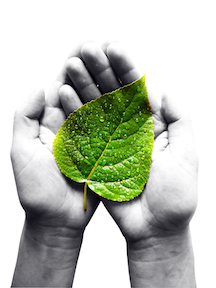By Victoria Mariconti
Boston College biology professor Laura Hake does not schedule quizzes, midterms, or even a final exam for her environmental studies course, BIOL144: Sustaining the Biosphere. Homework is collected but once every two weeks, and assignments include journaling, stargazing, and a barefoot walk through the grass. On paper, Sustaining the Biosphere does not appear rigorous. Hake graciously invites, however, only those students with the fortitude and maturity to learn outside of the anticipated lecture structure to remain.
Sustaining the Biosphere addresses the common body of major ecological crises: “climate, air and water pollution, urbanization, food and agriculture, population growth, and biodiversity” are all promised in the official course description. Rather than simply introduce students to the statistics and nuances of each grave issue, Hake has reinvigorated the potential of the core curriculum: she creates a unique classroom experience that empowers a diverse pool of undergraduates to tangibly attend to Earth in its present condition. Before attempting to redress the problems of natural systems, students must learn to assess and recalibrate how they navigate intra- and inter-personal human systems. To phrase this in the language of the course, an increase in Earth-consciousness demands increases in personal and social consciousness.
Although Hake has been responsible for cultivating the class at Boston College, she transplanted the concept from Christopher Uhl, a professor of biology at The Pennsylvania State University. Uhl has devoted over twenty years to shaping an environmental studies course, BiSci 3, or Awaken 101, that culminated in his book Developing Ecological Consciousness: The End of Separation (2013). Hake selected Uhl’s work as the class text and initiated personal communication with him to transcribe his course and vision. On his personal webpage, Uhl describes why his text offers an innovative approach to environmental studies. He writes:
“This book is a marked departure from those standard environmental science texts strongly focused on actions that humans need to take to fix the environment. My thesis is that the path to living in harmony with Earth begins…with fixing ourselves, specifically our perceptions about Earth, the planet that has birthed us into being…In my view it is time to acknowledge the ways that our cultural conditioning leads to separation from self, other, and Earth.”
Uhl identifies various cultural and educational practices as the foundations of detrimental mindsets–ultimately captured by the term “separation”–that have allowed human systems to harm the environment. To simplify an example from his book, Uhl links the forest fragmentation that results from restless suburban sprawl to recent increases in Lyme disease. The deer and mice populations that thrive in fragmented forests have spiked, and the tick population that carries Lyme has increased accordingly with its hosts. The connection is clear: a particular and rather uncontested housing practice has damaged a fragile ecosystem.
In her adaptation, Hake enthusiastically realizes Uhl’s call for a disruption of the negative “cultural conditioning” specific to learning environments. She begins every class with a short, narrated meditation that invites students “to come to presence” by physically “bowing to the present moment.” A typical class exercise might require students to intentionally misname common objects to demonstrate the tendency to cling to arbitrary sound units as the vessels of meaning. Every homework assignment involves an intense reflection component to help students become conscious of their learning methods. These practices may appear foreign to the educational jurisdiction of the natural sciences, but this perception proves the point: the intellectually integrated student who develops a critical eye for her personal and cultural practices is better prepared to accept and practice innovative methodologies.
When questioned about her progressive methods as a natural science educator, Hake admitted, “Half the students love it, half the students hate it. And the students that don’t like it want to be told what to memorize. What I wanted to bring along [to Sustaining the Biosphere] were the students who weren’t in that mindset.” Exams are superfluous to Hake’s vision for ecological education; her students’ impactful engagement with the environment will ultimately assess how well they came to personal and Earth-consciousness.
Victoria Mariconti is a senior at Boston College majoring in music. She became a member of Phi Beta Kappa in her junior year. Boston College is home to the Omicron of Massachusetts Chapter of Phi Beta Kappa.




